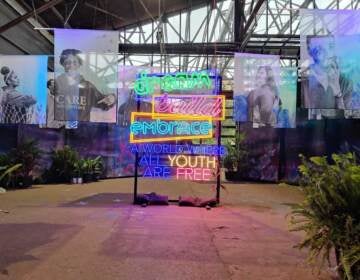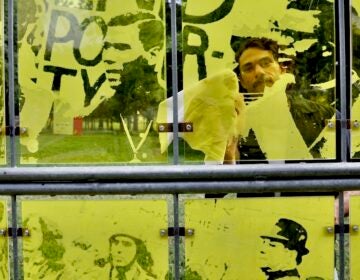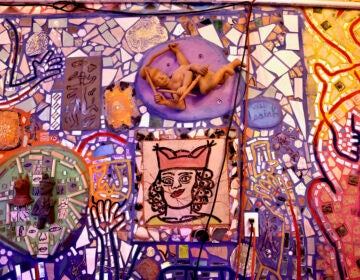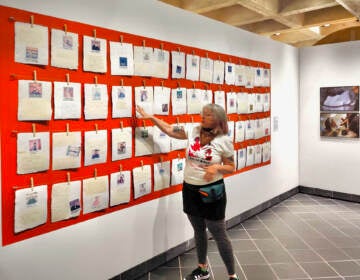A giant glass box has landed at Philly’s Independence Mall. Who are those people inside?
A new pop-up installation in Center City advocates for clean slate laws using life-size stacks of paperwork.
Listen 1:06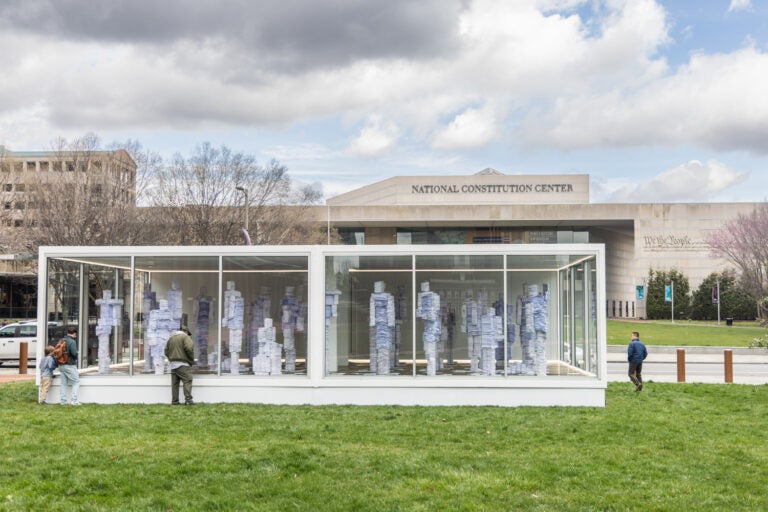
‘Waiting Workforce’ on Independence Mall in Philadelphia features sculptures made from expungement paperwork and advocates for the right of returning citizens to return to work. (Kimberly Paynter/WHYY)
From Philly and the Pa. suburbs to South Jersey and Delaware, what would you like WHYY News to cover? Let us know!
It’s a glass box about the size of a rowhouse with alien-like figures looking out. The structure now sits in Independence Historic National Park, at Market Street between 5th and 6th, right outside the Visitor’s Center.
The 38 life-size figures made of stacked paper represent the number of states that do not have legislative policies expediting the expungement of criminal records, or clean slate laws.
The stacks of paper symbolize the paperwork needed to get a criminal history erased.

“This represents the mounds and mounds of paper that individuals have to go through in order to get those records expunged,” said Nan Gibson, executive director of the JPMorgan Chase PolicyCenter. “The figures are hunched over. It’s a graphic representation of the weight of those records.”
JPMorgan Chase commissioned this art and advocacy installation, called “Waiting Workforce,” from the Glue Society, an international artist collective based in London.
“Waiting Workforce” made its debut in Philadelphia in part because Pennsylvania was the first of 12 states to pass clean slate laws. The laws make record expungement easier, in some cases even automatic, and require no paperwork at all. Recently, Pennsylvania Gov. Josh Shapiro signed a third iteration of that policy into law.
Those with complicated criminal records that do not trigger automatic erasure by state law can get legal help at expungement clinics held occasionally around the region.
JPMorgan Chase is also hosting a business conference this week at the Wharton School about second chance employment, trading best practices toward hiring people with criminal records.
About 1 in 3 adults in America have a criminal record, or roughly 77 million people, which can impede their ability to find employment. JPMorgan Chase has “banned the box” on its job applications, meaning they do not initially ask about criminal records and do not consider past criminal activity if it is not relevant to the position.
Gibson said that results in about 3,000 hires a year for people with some kind of criminal record.
“We recognize the importance of it for our firm, and we recognize the importance of it to the economy and society more broadly,” she said. “We’re trying to make changes at scale. This is a way to do that.”
JPMorgan Chase is advocating other companies do the same, and has been involved with lobbying legislators in eight states to pass clean slate laws.
“Waiting Workforce” will be on view for about a month.

Get daily updates from WHYY News!
WHYY is your source for fact-based, in-depth journalism and information. As a nonprofit organization, we rely on financial support from readers like you. Please give today.



